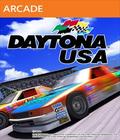XBLA Review - 'Daytona USA' (original) (raw)
XBLA Review - 'Daytona USA'
by Adam Pavlacka on Dec. 2, 2011 @ 12:00 a.m. PST
 Speeding out of the past from its 1993 debut, Daytona USA has been tuned up and overhauled with enhanced graphics, steering wheel support and, for the first time on home consoles, online multiplayer.
Speeding out of the past from its 1993 debut, Daytona USA has been tuned up and overhauled with enhanced graphics, steering wheel support and, for the first time on home consoles, online multiplayer.
When it comes to arcade racing games, Daytona USA is the granddaddy of the all. Sega's own Virtua Racing may have preceded it, but it was Daytona that set the standard for years to come. The first polygonal racing game to feature extensive texture maps, Daytona not only looked good, but it also played well. It may not compare to the looks of Forza Motorsport 4 or Gran Turismo 5 today, but when it debuted on Sega's Model 2 hardware in 1993, the game was a sight to behold. Impressively enough, the gameplay is just as engaging today as it was nearly two decades ago.
Though it is presented as a port of the original game, it would be more accurate to call the XBLA version of Daytona USA a console version of Sega Racing Classic. First seen in arcades roughly two years ago, Sega Racing Classic was essentially Daytona USA running on a slightly upgraded engine, in widescreen and 720p, but with no Daytona branding. This version retains the visual updates but brings back the Daytona license and the original music.
Offering up three different tracks (along with the mirror versions of each) and two different cars, Daytona's draw was never on variety but rather on skill. Mastering the game required learning each track perfectly. One mistake and you're going to lose precious time, making a first-place finish nearly impossible. It makes sense, as the whole point of an arcade game is to eat quarters, but the beauty of Daytona is how it encourages you to jump back in for "just one more try."
Playing on the default arcade difficulty level, it is rather easy to make your way to the center of the pack. After that, taking a rank and holding it rides on finding the perfect racing line. In some racing games, bouncing off walls or other cars can be an advantageous cornering technique. Not so here. Instead, the trick is learning how to drift through an open turn or use your gearshift as a sort of pseudo speed limiter when entering a tight turn.
In addition to slowing you down, contact with walls and cars can result in damage to your vehicle. Damage noticeably hinders performance, so there is a built-in motivation to drive well. Each track has a pit stop, which will fully repair any damage; however, the time penalty is nearly impossible to recover from unless you're playing an endurance race. On the flip side, strategic pitting is necessary when doing an endurance run because your tires will decay.
Given the rather good AI drivers, solid control is a necessity in Daytona USA, and the game delivers in spades. No matter if you're playing with a controller or using a wheel to replicate the arcade experience, moving down the track always feels spot-on. There is a slight advantage to using the wheel, as it is easier to maintain a consistent line through turns and paddle shifting is more convenient, but the game certainly doesn't require one. Having the tight control is a good thing, especially since drafting other cars is a key technique for building up speed. It's a far cry from the twitchy mess that plagued the Dreamcast version of the game.
In addition to the standard arcade mode, Daytona USA also offers challenge, karaoke, time trial and survival modes. Challenge presents you with 30 specific challenges (10 per track) that must be completed in order. Each challenge is designed around a specific driving technique or part of a track, so it's a good place for beginners to improve their skills. Veteran players will likely find the challenges somewhat pedestrian, though.
Karaoke mode is a bit of fan service in that it allows you to select one of the four songs and then race while the lyrics appear on-screen. With no microphone support and no real scoring, it feels like something tacked on at the last moment, but it is an easy Achievement.
Time trial has you racing against the clock, while the goal in survival is to go for distance. In the first instance, it's just you and the road, but in survival, you have to contend with other cars as well. Survival starts you out with a limited amount of time, and precious extra seconds can be added to the clock by performing specific maneuvers as well as crossing checkpoints. For example, if you pull a drift, overtake a few cars or run without pressing the brakes, you'll gain extra time. Because it uses the endurance rules, your tires will wear out in survival, requiring you to plan for the occasional pit stop.
Rounding out the package is online multiplayer support for up to eight players — just like the arcade. Sadly, there isn't a huge community for this one online, so if you want to prove your skills, plan on setting up an Xbox Live party with friends. Finding strangers isn't easy.
It may not have the multitude of options or the shiny visuals of today's racers, but Daytona USA is still a game with a plenty of depth. Easy to learn but difficult to master, this is the definitive home version of Sega's arcade classic. With an asking price of 800 MSP ($10 USD), kicking off a "Rolllling Staarrt!!" has also never been this affordable.
Score: 8.0/10